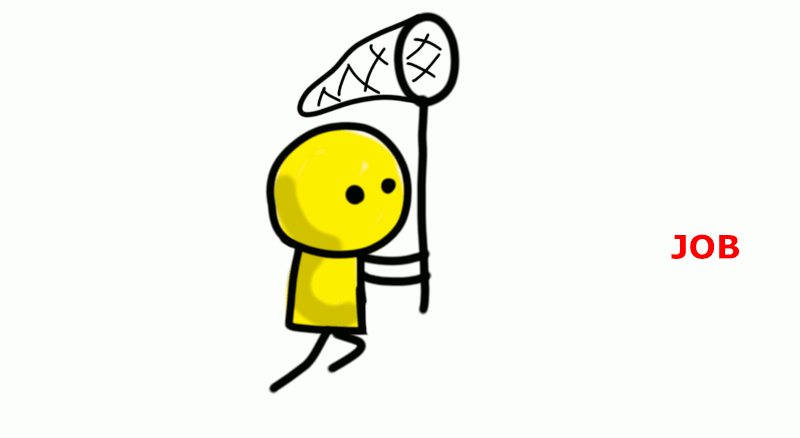My mistakes on the path to impact by Denise_Melchin has some really useful lessons, but it’s kinda long and the key information isn’t particularly prominant. To make it more user friendly, I turned it into an illustrated listicle.
The following are mostly quotes, with some paraphrasing. Typos are probably my fault.
This is experimental and feedback is highly appreciated.
12 mistakes on the path to impact
I should’ve applied to more jobs.
After finishing my degree and post-graduation summer internship, I only applied to ~7 roles, exclusively at EA organisations.
When I finally started a ‘real job’, it had been almost 3 years since I graduated.
I was endlessly confused why I seemed to have done so well in some contexts, but was still failing to get anywhere. Often I wondered whether there was something seriously wrong with me.
I now think there was nothing to explain here—most people who want a job as much as I did apply to more than one highly competitive job every month or two.
I put too much weight on what other people thought I should be doing, and wish I had developed stronger internal beliefs.
I stopped doing political work as I had the impression that it was EA consensus that this was not particularly valuable.
I now regret this, it might have opened high impact routes later on.
Some of the people I used to work with have done very well on the political ladder.
Being unemployed or underemployed was more detrimental to motivation and well-being than expected.
The big shift here came after starting a data analyst job in the UK Civil Service and my misery which had reduced me to tears each week for over 2 years was basically cured overnight.
While the direction of the change is not surprising, it has been astounding to me how much more productive I have been this year compared to previous years.
Being miserable also hindered my ability to assess my prospects rationally.
I was too willing to take risks.
My deference to the EA community made me blind towards the risks I was taking. I did not think carefully enough about the position I would be in if focusing on EA jobs failed: that of a long-unemployed graduate with no particular skills.
I stopped trying to do well in my degree, as good grades seemed unnecessary.
The advice to be willing to take more risks prominent within EA was geared towards ‘talented, well-credentialed graduates without responsibilities’ - whether talented or not, I am not well-credentialed and have dependents. Therefore I should have questioned more how much this advice really applied to me.
I do not think I appreciated how valuable work is as a calibration exercise.
Whenever people talked about ‘figuring out what you are good at’, I didn’t understand why this was so valuable.
Learning ‘what I am good at’ this year has mostly not looked like discovering I am better or worse at a skill than I thought, but instead discovering how good other people are at the same skills.
I have gotten some positive feedback on traits I thought I was weak on, but was apparently still better than other analysts.
I have also found out about some skill axes that I never realised there was any meaningful variance on.
I made few attempts to build skills for the type of work I was most interested in doing (research).
I underestimated the cost of having too few data points.
While I knew on some level that a lot of randomness is involved in many processes, including job applications, I still tried to find meaning in the little information I had.
I expected potential employers would judge whether I was a generally smart and capable person.
A better focus would have been whether I can help them solve their very specific problems.
I wasn’t focused on a specific role.
I thought having no strong preferences for a role would be considered a good thing, as it proved that I was being cooperative.
Most employers probably want to hear about how their role fits your particular skills and that you are really excited about it.
I worked in a support role for an EA researcher without any clear path to a real job or impact.
I received plenty of extremely positive feedback and wrongly had the impression that I would by default be able to do a lot of good in the near future.
I did not appreciate how messages get distorted and amplified through the community.
Eg, “talent constrained” doesn’t mean it’s easy to get a job.
Denise also notes that:
Writing this post has been very personally useful to me, and I can recommend undertaking such an analysis.
And this comment by Michelle_Hutchinson seemed worth including:
I’d also guess that most people should be pushing themselves to apply for more roles than they’d naturally be inclined to. Doing that seems really hard given how horrible applying for jobs is, and that it feels like the way to do well in a particular job process is to get really invested in that specific job, which feels like it precludes applying for many at once.
Feedback requests:
What article/post/book should I do next?
How useful is this?
On a 1-10 scale?
In dollars?
In QALYs?
How can I make this better?
I didn’t indicate which parts were direct quotes and which parts were paraphrase because it would add lots of messy punctuation with little value. Do you agree with this decision?
If you liked this, consider checking out my blog. I plan on doing more illustrated summaries of EA material.
Illustrated Summary: My mistakes on the path to impact
My mistakes on the path to impact by Denise_Melchin has some really useful lessons, but it’s kinda long and the key information isn’t particularly prominant. To make it more user friendly, I turned it into an illustrated listicle.
The following are mostly quotes, with some paraphrasing. Typos are probably my fault.
This is experimental and feedback is highly appreciated.
12 mistakes on the path to impact
I should’ve applied to more jobs.
After finishing my degree and post-graduation summer internship, I only applied to ~7 roles, exclusively at EA organisations.
When I finally started a ‘real job’, it had been almost 3 years since I graduated.
I was endlessly confused why I seemed to have done so well in some contexts, but was still failing to get anywhere. Often I wondered whether there was something seriously wrong with me.
I now think there was nothing to explain here—most people who want a job as much as I did apply to more than one highly competitive job every month or two.
I put too much weight on what other people thought I should be doing, and wish I had developed stronger internal beliefs.
I stopped doing political work as I had the impression that it was EA consensus that this was not particularly valuable.
I now regret this, it might have opened high impact routes later on.
Some of the people I used to work with have done very well on the political ladder.
Being unemployed or underemployed was more detrimental to motivation and well-being than expected.
The big shift here came after starting a data analyst job in the UK Civil Service and my misery which had reduced me to tears each week for over 2 years was basically cured overnight.
While the direction of the change is not surprising, it has been astounding to me how much more productive I have been this year compared to previous years.
Being miserable also hindered my ability to assess my prospects rationally.
I was too willing to take risks.
My deference to the EA community made me blind towards the risks I was taking. I did not think carefully enough about the position I would be in if focusing on EA jobs failed: that of a long-unemployed graduate with no particular skills.
I stopped trying to do well in my degree, as good grades seemed unnecessary.
The advice to be willing to take more risks prominent within EA was geared towards ‘talented, well-credentialed graduates without responsibilities’ - whether talented or not, I am not well-credentialed and have dependents. Therefore I should have questioned more how much this advice really applied to me.
I do not think I appreciated how valuable work is as a calibration exercise.
Whenever people talked about ‘figuring out what you are good at’, I didn’t understand why this was so valuable.
Learning ‘what I am good at’ this year has mostly not looked like discovering I am better or worse at a skill than I thought, but instead discovering how good other people are at the same skills.
I have gotten some positive feedback on traits I thought I was weak on, but was apparently still better than other analysts.
I have also found out about some skill axes that I never realised there was any meaningful variance on.
I made few attempts to build skills for the type of work I was most interested in doing (research).
I underestimated the cost of having too few data points.
While I knew on some level that a lot of randomness is involved in many processes, including job applications, I still tried to find meaning in the little information I had.
I expected potential employers would judge whether I was a generally smart and capable person.
A better focus would have been whether I can help them solve their very specific problems.
I wasn’t focused on a specific role.
I thought having no strong preferences for a role would be considered a good thing, as it proved that I was being cooperative.
Most employers probably want to hear about how their role fits your particular skills and that you are really excited about it.
I worked in a support role for an EA researcher without any clear path to a real job or impact.
I received plenty of extremely positive feedback and wrongly had the impression that I would by default be able to do a lot of good in the near future.
I did not appreciate how messages get distorted and amplified through the community.
Eg, “talent constrained” doesn’t mean it’s easy to get a job.
Denise also notes that:
And this comment by Michelle_Hutchinson seemed worth including:
Feedback requests:
What article/post/book should I do next?
How useful is this?
On a 1-10 scale?
In dollars?
In QALYs?
How can I make this better?
I didn’t indicate which parts were direct quotes and which parts were paraphrase because it would add lots of messy punctuation with little value. Do you agree with this decision?
If you liked this, consider checking out my blog. I plan on doing more illustrated summaries of EA material.